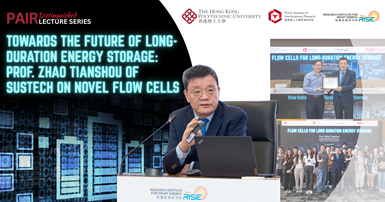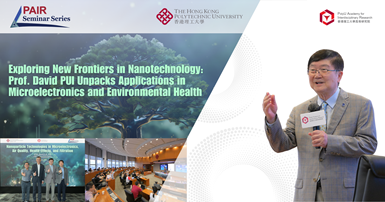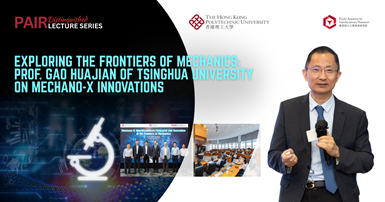Towards the future of long-duration energy storage: Prof. ZHAO Tianshou of SUSTech on novel flow cells
Prof. ZHAO Tianshou, Director of Energy Institute for Carbon Neutrality, Chair Professor of Mechanical and Energy Engineering, Southern University of Science and Technology (SUSTech), China, delivered the 41st PAIR Distinguished Lecture titled “Flow Cells for Long-Duration Energy Storage” on 4 July 2025 on the PolyU campus. The lecture drew over 90 attendees in person and captivated an online audience of more than 15,400 from different countries and regions who watched the live broadcast on social media platforms.
The lecture commenced with a warm welcome and an introduction of the speaker by Prof. WANG Shengwei, Director of Otto Poon Charitable Foundation Research Institute for Smart Energy (RISE).
Prof. Zhao opened his lecture by stressing the critical role of energy storage in achieving carbon neutrality goals, particularly China’s pledge to be carbon neutral by 2060. He emphasised that future power systems will require energy storage solutions integrated across power generation, transmission and consumption, and the energy storage industry scale is projected to reach a trillion pounds. Prof. Zhao mentioned that grid-scale energy storage must meet three core requirements: safety and reliability, cost-effectiveness, and not being limited by site and resource constraints. He pointed out that changes in environmental conditions can cause fluctuations in renewables’ power generation, and this intermittency problem can last dozens of hours. As such, long-duration energy storage is the key to preventing energy curtailment and enhancing grid flexibility.
Prof. Zhao advocated the use of “flowable energy carriers” (e.g., hydrogen, methanol, ammonia) and “flow cells” (e.g., electrolysers, fuel cells, flow batteries) to achieve efficient, long-duration and site-flexible energy storage solutions. He introduced the advantages, applications and challenges of two types of flow cells: “hydrogen storage technology” and “redox flow batteries”. Although hydrogen storage technology offers advantages in terms of high energy density, long duration, and no site constraints, its requirements for platinum electrode materials, as well as low-temperature, high-pressure storage and transportation conditions, have made the technology costly. Redox Flow Batteries are particularly suitable for large-scale energy storage due to their safety, durability, flexible storage duration, and detachable device design, but their high costs remain an issue. Prof. Zhao highlighted that the present core scientific challenge is to develop theories and methods for predicting and designing matched microscopic and macroscopic structures by understanding the interplay between surface reactions and transport within multiscale structures, thereby achieving synergy between reactions and transfer to maximise battery performance. His team employs an interdisciplinary approach, combining electrochemistry and thermofluid science to develop thermo-electrochemical theory, which has led to innovations in membranes and electrodes, as well as the successful development of a flow battery with a charge/discharge cycle life of over 15,000 cycles, the longest cycle life for flow batteries.
Finally, Prof. Zhao introduced the concept of “e-fuel”, a clean, renewable, electrically rechargeable liquid fuel. E-fuel energy storage technology has no site and time limitations, and exhibits high efficiency and power density, scalability, safety and potential for economic viability. It represents an excellent alternative to conventional fuel cells. In closing, Prof. Zhao stated that his research aims to establish the scientific foundations for breakthroughs in energy storage technologies, enabling the widespread adoption of clean energy through optimised performance, cost and lifetime.
Following the presentation was a lively question-and-answer session. The audience engaged in a productive discussion with Prof. Zhao.
Please click here for an online review.
PAIR Distinguished Lecture Series












